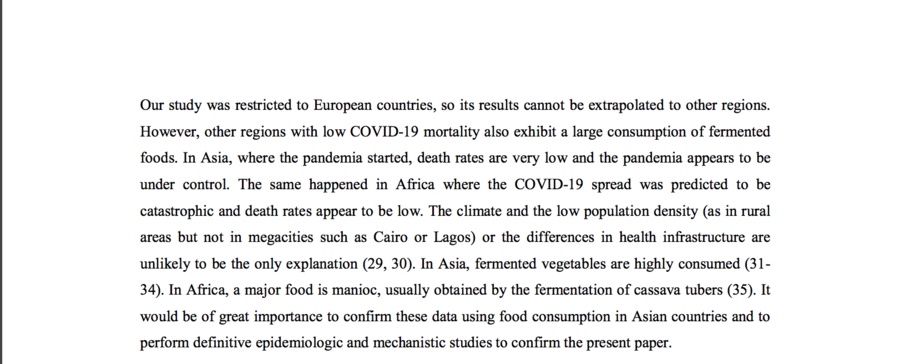
Did a study find a diet heavy with kimchi -- spicy fermented cabbage and other vegetables -- helped lower South Korea's COVID-19 fatalities? No, that's not true. A claim that has gone viral asserts that a study proved a connection between kimchi and South Korea's relatively low COVID-19 death rate, but research behind the study wasn't done in South Korea -- it was done in Europe. And the study cited is only a "preprint," meaning it has not been peer reviewed and therefore should not be used for data.
The story appeared as an article published by NextShark.com on July 20, 2020, titled "Kimchi Helped Lower South Korea's COVID-19 Fatalities, Study Finds" (archived here) which opened:
Low COVID-19 fatality rates in South Korea may be attributed to kimchi, a recent study has found. The study: A team of researchers in France, led by Pulmonary Medicine at Montpellier University honorary professor Dr. Jean Bousquet, conducted a study on the dietary preferences of countries with low fatalities from the novel coronavirus. Reported in the journal of Clinical and Translational Allergy, the study found that countries where diet mainly consists of fermented cabbage had lower reported deaths from the ...
Users on social media only saw this title, description and thumbnail:
Kimchi Helped Lower South Korea's COVID-19 Fatalities, Study Finds
Low COVID-19 fatality rates in South Korea may be attributed to kimchi, a recent study has found. The study: A team of researchers in France, led by Pulmonary Medicine at Montpellier University honorary professor Dr. Jean Bousquet, conducted a study on the dietary preferences of countries with low fatalities from the novel coronavirus. Reported in the journal of Clinical and Translational Allergy, the study found that countries where diet mainly consists of fermented cabbage had lower reported deaths from the ...
The glaring problem with this article on NextShark.com and also published on TheHealthyArchive.com and on Donga.com is the study that is referenced on Medrxiv -- an online archieve for unpublished manuscripts -- does not mention South Korea and research was only conducted for European countries.
This is the headline of the actual study, which clearly states "Europe":
Association between consumption of fermented vegetables and COVID-19 mortality at a country level in Europe
The study was conducted by a team of researchers in France, led by Pulmonary Medicine at Montpellier University honorary professor Dr. Jean Bousquet.
The site warned that the study is a "preprint," here is why that is a warning about the information in the study:
This article is a preprint and has not been peer-reviewed [what does this mean?]. It reports new medical research that has yet to be evaluated and so should not be used to guide clinical practice.
Within the study there are multiple statements that only Europe was considered in the report, not South Korea, and it warned that it should not be used to make assumptions about other countries in the world.
This is how the study opened says in its opening that the researchers' goal was, "To test the potential role of fermented foods in COVID-19 mortality in Europe ... " and the study plainly says results "cannot be extrapolated to other regions."
The NextShark.com article claims that the study was published in the Journal of Clinical and Translational Allergy.
That journal hasn't published a single issue yet as of July 21, 2020. Here is an archived link to the page.
The Clinical and Translational Allergy journal does have an article published by one of the authors of the study, Jean Bousquet.
The article by Bousquet is titled "Is diet partly responsible for differences in COVID-19 death rates between and within countries?" and was published on May 27, 2020.
That article also only studied European countries and only briefly mentions Korea:
Nutrition may therefore play a role in the immune defense against COVID-19 and may explain some of the differences seen in COVID-19 across Europe. It will be needed to test dietary differences between low and high-rate countries. Foods with potent antioxidant or anti ACE activity--like uncooked or fermented cabbage [28,29,30]--are largely consumed in low-death rate European countries, Korea and Taiwan, and might be considered in the low prevalence of deaths.
That article concludes:
Understanding the within and between country differences in COVID-19 will be of paramount importance in understanding COVID-19 risk and protective factors, and will eventually help to control the epidemics.
We acknowledge that many factors may play a role in the extension and severity of COVID-19, such as trained immunity of the population, early and fast education, rapid organization and adaptation of the hospitals and the public, preparedness for pandemics and public hygiene. Diet represents only one of the possible causes of the COVID-19 epidemic and its importance needs to be better assessed.
South Korea -- where kimchi is a dietary staple -- does have a low amount of deaths from COVID-19, with 296 deaths and 13,186 cases for a country with a population of approximately 50 million, according to Worldometers.com.
However, this study does not publish data that shows kimchi is the reason for the country's low coronavirus death rate. In fact, the medRxiv website in their "About" section warns the news media not to use the studies for "established information."
medRxiv (pronounced "med-archive") is a free online archive and distribution server for complete but unpublished manuscripts (preprints) in the medical, clinical, and related health sciences. Preprints are preliminary reports of work that have not been certified by peer review. They should not be relied on to guide clinical practice or health-related behavior and should not be reported in news media as established information.


















